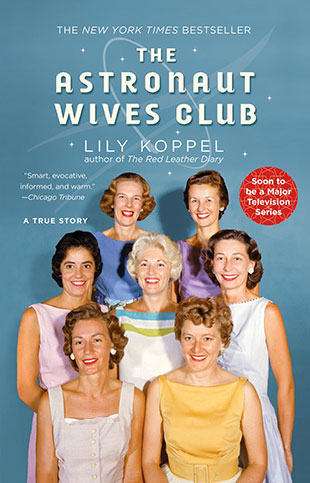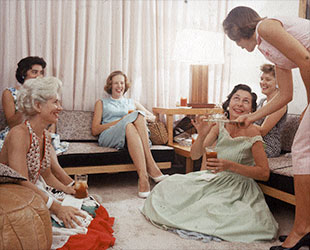June 11, 2014 — It's been a year since the launch of "The Astronaut Wives Club" and Lily Koppel is back in orbit.
The 33-year-old author, whose latest bestseller traces the spouses of America's spacemen through the 1960s space race, has again embarked on a tour promoting "Astronaut Wives Club," this time for its paperback release by Grand Central Publishing.
The softcover however, is only the latest development for Koppel and the "Astronaut Wives." As if inspiring themed parties with "retro-recipes" wasn't enough, the book is now the basis for a limited event television series to premiere on ABC next spring.
collectSPACE caught up with Koppel as she embarked on her five-state book tour to discuss the new edition of "The Astronaut Wives Club" and the TV series it has sparked.

"Astronaut Wives" author Lily Koppel. (Mark Seliger/Hachette) |
The release of the softcover marks a year since "The Astronaut Wives Club" original release. Other than the television series (which we'll get to in a moment), can you share some of the highlights of the past year with regards to its reception? Any standout reactions?
marks a year since "The Astronaut Wives Club" original release. Other than the television series (which we'll get to in a moment), can you share some of the highlights of the past year with regards to its reception? Any standout reactions?
After the book came out, there were several book launch events — pun intended — but the party we had in Houston was particularly special because many of the wives still live there and attended, as did astronauts, socialites, and Joanne Herring (played by Julia Roberts in the 2007 movie "Charlie Wilson's War").
The jazz band played "Fly Me to the Moon." On the dance floor was Gene Cernan, known as the 'last man to walk on the moon.' I gave a speech and thanked all the wives, who were scattered around the room wearing yellow rose of Texas corsages, the astronaut wives' signature flower.
After I was done, Cernan asked for the mike. He first joked and said he was disappointed there was no "former husbands club" for him and his fellow astronaut buddies to join, but his voice faltered as he told the crowd, "If it were not for the wives who committed their lives to what we were doing, I don't think we would have ever gotten to the moon."
Why do you feel the book has resonated the way it has with readers? Do you think your book's success and the popularity of movies like last year's "Gravity" point to a renewed interest in spaceflight and its history?
In the Facebook-Twitter world, our horizons are reduced to this very little screen. Four decades ago, we were looking up at the moon.
I think movies like Gravity and The Astronaut Wives Club help us recapture the awe of space.
I believe The Astronaut Wives Club resonates so strongly with readers because it reveals the real lives behind the "perfect" astronaut wives, and peers behind the American myth of the hero to profile the spouses' tough times back on Earth.
Sometimes the most interesting, tantalizing stories are often those about women waiting in the wings of history.
"Stories of wives" as a kind of literature may hardly be seen as novelty anymore [but] in my opinion this topic generates peoples' interest because fifty years ago wives were not seen as important. They were arm-candy for the men, but today we can see them as "quiet" heroes in their own right.

"The Astronaut Wives Club" paperback cover art. (Hachette) |
Were there any changes or additions made to the book for the softcover edition?
"The Astronaut Wives Club" is a book club pick, so there's an expanded Reading Group Guide for the paperback. It includes book club questions and an author conversation, and also about half a dozen more photos.
Also I wrote a postscript essay on reconnecting with many of the wives and their children following the publication of the book.
Finally there's a section on planning an Astronaut Wives Club-themed book club night, including a few retro-recipes for desserts (and a Mount Marilyn Martini, too).
You're back on tour just as the authorized biography about Sally Ride, America's first woman in space, hits bookstore shelves. Can you contrast the two stories – the astronauts' wives with the introduction of the first women into NASA's astronaut corps?
[Cosmonaut] Valentina Tereshkova was the first woman to fly in space in 1963. Why was the first American woman Sally Ride in space was sent only 20 years later? What does it say about social atmosphere of America in 1950s, 1960s and 1970s?
These were all questions that concerned me while I wrote The Astronaut Wives Club. It was certainly reflective of the times. In the 1950s, American women were excluded from the decision making process. They were supposed to stay at home, run the house and raise children.
When I asked one of the most progressive wives, who later hosted her own feminist talk show in Washington, DC, Rene Carpenter, she said she and Annie Glenn totally agreed that it should be all male at the beginning.
They wondered, "How would women go to the bathroom comfortably, what about their periods?" It was a different world back then for women.
Okay, the television series — how did it come about?
The book was almost inspired by the feel of the Mad Men series. There is nothing as cinematic as going into space. A really smart TV series was the natural outgrowth of the book.
How involved are you in the series from a screenplay or production standpoint?
Stephanie Savage (the producer and writer of Gossip Girl, on the CW) will write the script and I will consult to make sure the series is as true to the spirit of the book and the wives' experiences as possible.

The wives of the Mercury astronauts entertaining, Virginia, 1959. From lower left: Rene Carpenter, Annie Glenn, Jo Schirra, Betty Grissom, Marge Slayton and Trudy Cooper. (LIFE via Hachette) |
Will you have a part on screen?
If I were to choose — I would love to be an astronaut wife for a day. I'd love to play a part and get the skyrocketing beehive and wear the swirling, candy-colored Pucci mini-dress! Many readers have suggested as much to me.
On second thought, maybe, too much hairspray and tears and deviled eggs required, but I loved writing about them. We'll have to wait and see.
Outside of the series and "The Astronaut Wives Club," are there more stories to be told?
Many readers have asked me what the space race was like for the "Astrokids." I interviewed many of them about their experiences and what it was like growing up in the close-knit community of astronaut families back when the space program was ramping up in the '60s. Their mothers often had to pry their kids away from Star Trek to watch their dad's launch into space.
It was also hard on the kids having a hero dad who was often an absentee father figure, as the astronaut wives took on the role of "superhero mom" while the astronauts were away training for most of the week down at the Cape. But in many ways the kids were growing up in the cradle of the American Dream.
For more about "The Astronaut Wives Club," the softcover release and TV series, see the book's website.
